Nov 29, 2017 | Non categorizzato, Spiritualità, Word of
for ages 4-8 | for ages 9-17 | Print | Audio
A young woman is in her house in Palestine — a distant, little known corner of the powerful Roman Empire. Suddenly she receives an unexpected, rather disturbing visitor: a messenger from God, asking something of her and awaits her reply. “Rejoice!’’ the angel says to Mary. Then he reveals God’s abounding love for her, inviting her to collaborate in fulfilling God’s plans for humanity. With a sense of wonder and joy, Mary accepts the gift of this personal meeting with the Lord. She gives herself entirely to this yet-unknown plan because of her complete trust in God’s love. With her generous and wholehearted “Here am I”, Mary decisively puts herself at the service of God and people, giving a shining example of how to accept God’s will. “Here am I, the servant of the Lord; let it be with me according to your word (Lk 1:38).” Meditating on this Gospel passage, Chiara Lubich wrote in 1981: “To fulfil his plans, God needs people who surrender themselves to him as humbly and as readily as a servant. “Mary is the true representative of humanity, whose destiny she took on. With this attitude, she gives God all the space he needs for his creative action. “However, the term ‘servant of the Lord’ is not only an expression of humility, but also a title of nobility, given to the great servants in salvation history, like Abraham, Moses, David and the prophets.” “Therefore, by using these words, Mary also affirms her greatness.’’ “Here am I, the servant of the Lord; let it be with me according to your word (Lk 1:38).” We, too, can discover God’s presence in our lives and listen to the word he says to us, asking us to fulfil part of his design of love, part of his design of love for history, here and now. Our weakness and sense of inadequacy may hinder us. So let us believe the angel’s words, “for nothing will be impossible with God” (Lk 1:37), and trust in God’s power more than in our own strength. This experience will free us from our limitations and from presuming that we’re self-sufficient. We will find new energy and talents we did not know we had, enabling us to love in our own way. “Right at the start of our marriage,” shared one couple, “we opened our house to the families of children in our city’s hospitals. More than 100 families came to our house, and we continually tried to create a family atmosphere for them. “We often received providence, which helped us cover our expenses, but we needed first to be open to welcoming people. “Not long ago, we received some money and decided to put it on one side, being sure it would be useful for somebody. In fact, soon afterwards another request arrived. “It is all a game of love with God, and our part is just to be ready and play along.” “Here am I, the servant of the Lord; let it be with me according to your word (Lk 1:38).” Chiara’s words about accepting the Word of God as Mary did can help us live this phrase of the Gospel. “Being completely available, knowing that it is not merely human word … As it is the Word of God, it contains a presence of Christ. “So you can receive Christ, in his Word, within you. Then put it into practice actively and readily, moment by moment. “If you do this, the world will once again see Christ walking through the streets of our cities. Christ in you, clothed like everyone else. Christ at work in offices, schools and the most varied places; Christ amongst all.’’ Now that we are preparing for Christmas, let us find some time, as Mary did, to spend “one on one’’ with the Lord, perhaps by reading a page of the Gospel. Let us try to recognize his voice in our conscience, which will be enlightened by his Word. We will become more sensitive to the needs of the brothers and sisters we will meet. Let us ask ourselves, how can I be a presence of Jesus today? How can I contribute, where I am, to making all people one family? Saying ‘‘Here am I’’ to God will allow him to sow peace around us and increase the joy in our hearts. Letizia Magri
Nov 29, 2017 | Non categorizzato
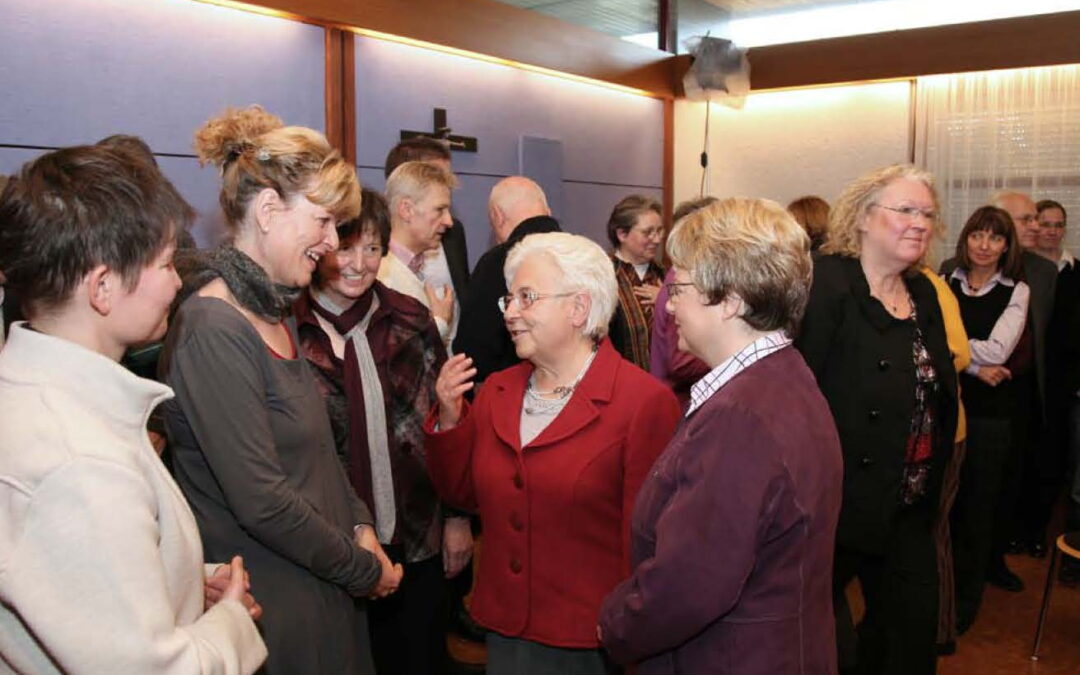
Nov 28, 2017 | Non categorizzato
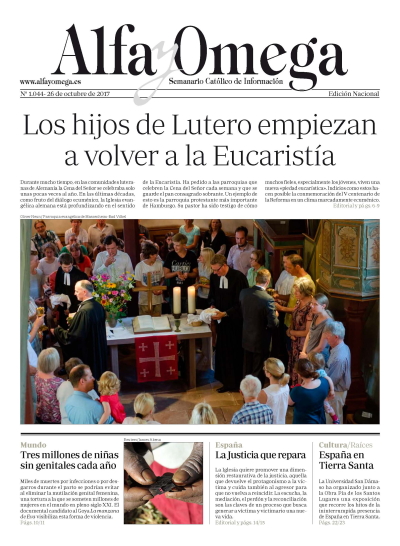 The keyword is “journey”, because “truth is sought through journeying”. Maria Voce, or Emmaus as she is known in the Focolare, became animated as she described Pope Bergoglio’s vision of ecumenism. Her eyes lit up when speaking about an ecclesial reality which truly has unity as its vocation. Such was the route undertaken by Focolare founder Chiara Lubich. It is one of the very few movements born in the Catholic Church which embraces the faithful of other churches. It is indeed a rarity in times of fragmentation. “I think that true Catholicism is what God perceives it to be: a gathering of communities each having their own identity. I imagine the moment will come, because it must come, when everyone will be one. Jesus asked for this. Therefore not just one Catholic Church: it could be Catholic in the sense of universal, but not a single Roman Church or a single Church of Constantinople.” Your words came across almost as a provocation. “Of course, they’re provocative!” Maria Voce replied. It was clear that in her “provocation” she felt supported by the Argentinean Pope. On 3 June, the last Sunday of Pentecost, the Pontiff convened the charismatic Catholic and non-Catholic movements. Before the meeting had even started, the Pope specifically asked for Maria Voce. A priest went looking for her and she joined the group of leaders sitting on the stage. At the end of his speech, the Pope approached her and, to her great surprise, took her by the hand: “Come, Maria …,” he said without adding anything else. And they left the assembly together. “From the first moment of his election, when he appeared on the balcony to greet the crowds and introduced himself as a Bishop and not as a Pontiff, I understood that it was already a sign of his ability to relate to other churches.” “Jorge Mario Bergoglio,” Maria Voce recalls, “had a living experience of ecumenism with other churches in Buenos Aires. Considering that time, Maria Voce identified the seed of what happened as a consequence during his pontificate, which reached its utmost expression with the Pope’s presence, almost a year ago, in commemorative celebrations held in Lund (Sweden) which marked the 5th centenary of the Protestant Reformation of Martin Luther. “Something immense happened in Lund, when two Church leaders at the same level of authority met and signed a joint statement.” The challenge is to follow the Pope’s example and join in the ‘spirit of Lund’. “If John Paul II will always be remembered for the ‘spirit of Assisi’, the present Pope should be remembered for the ‘spirit of Lund’.”
The keyword is “journey”, because “truth is sought through journeying”. Maria Voce, or Emmaus as she is known in the Focolare, became animated as she described Pope Bergoglio’s vision of ecumenism. Her eyes lit up when speaking about an ecclesial reality which truly has unity as its vocation. Such was the route undertaken by Focolare founder Chiara Lubich. It is one of the very few movements born in the Catholic Church which embraces the faithful of other churches. It is indeed a rarity in times of fragmentation. “I think that true Catholicism is what God perceives it to be: a gathering of communities each having their own identity. I imagine the moment will come, because it must come, when everyone will be one. Jesus asked for this. Therefore not just one Catholic Church: it could be Catholic in the sense of universal, but not a single Roman Church or a single Church of Constantinople.” Your words came across almost as a provocation. “Of course, they’re provocative!” Maria Voce replied. It was clear that in her “provocation” she felt supported by the Argentinean Pope. On 3 June, the last Sunday of Pentecost, the Pontiff convened the charismatic Catholic and non-Catholic movements. Before the meeting had even started, the Pope specifically asked for Maria Voce. A priest went looking for her and she joined the group of leaders sitting on the stage. At the end of his speech, the Pope approached her and, to her great surprise, took her by the hand: “Come, Maria …,” he said without adding anything else. And they left the assembly together. “From the first moment of his election, when he appeared on the balcony to greet the crowds and introduced himself as a Bishop and not as a Pontiff, I understood that it was already a sign of his ability to relate to other churches.” “Jorge Mario Bergoglio,” Maria Voce recalls, “had a living experience of ecumenism with other churches in Buenos Aires. Considering that time, Maria Voce identified the seed of what happened as a consequence during his pontificate, which reached its utmost expression with the Pope’s presence, almost a year ago, in commemorative celebrations held in Lund (Sweden) which marked the 5th centenary of the Protestant Reformation of Martin Luther. “Something immense happened in Lund, when two Church leaders at the same level of authority met and signed a joint statement.” The challenge is to follow the Pope’s example and join in the ‘spirit of Lund’. “If John Paul II will always be remembered for the ‘spirit of Assisi’, the present Pope should be remembered for the ‘spirit of Lund’.”
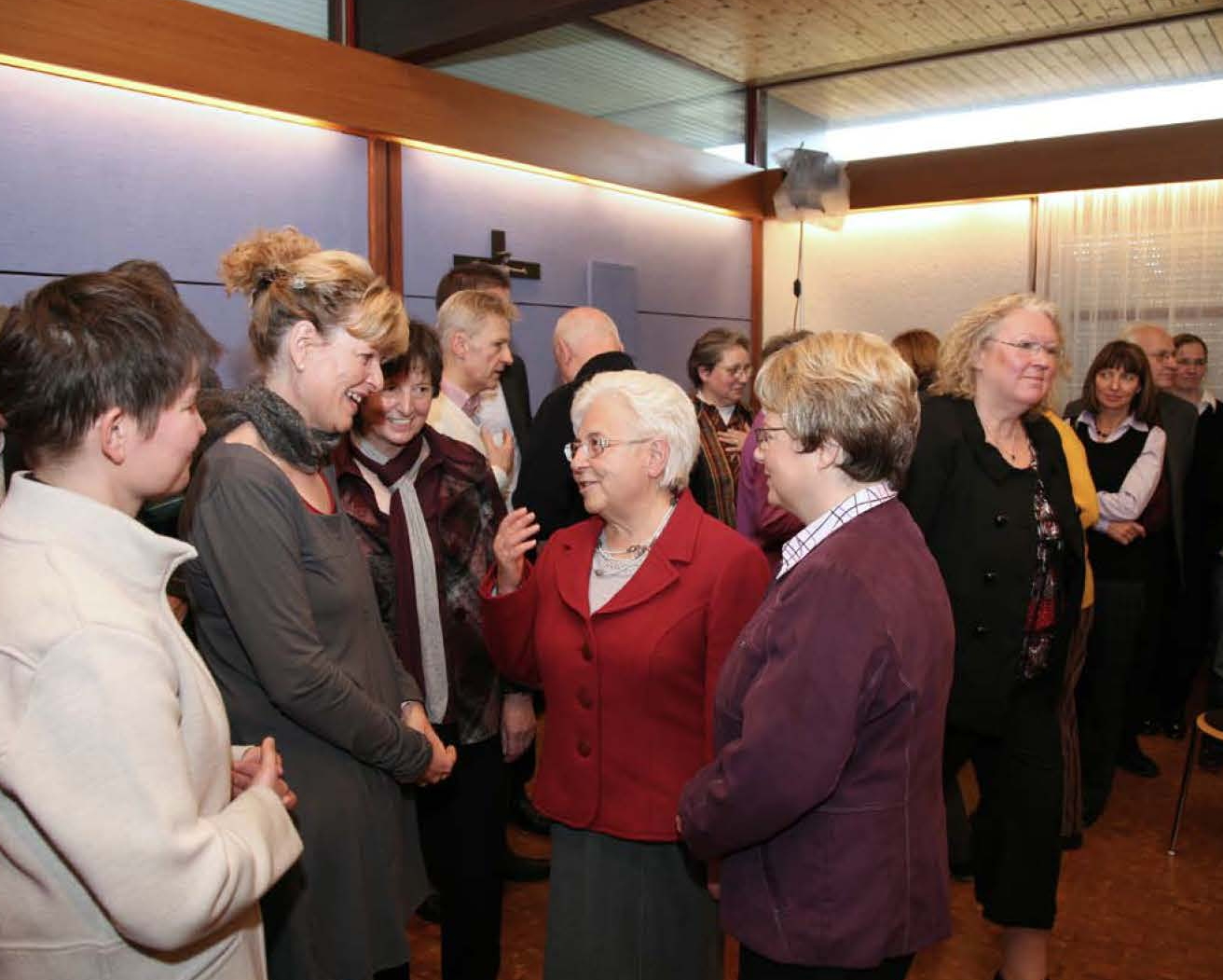
Ottmaring, Germany: María Voce during a meeting with a group from the Evangelical Church on 1 novembre 2009. Photo courtesy of Alpha y Omega
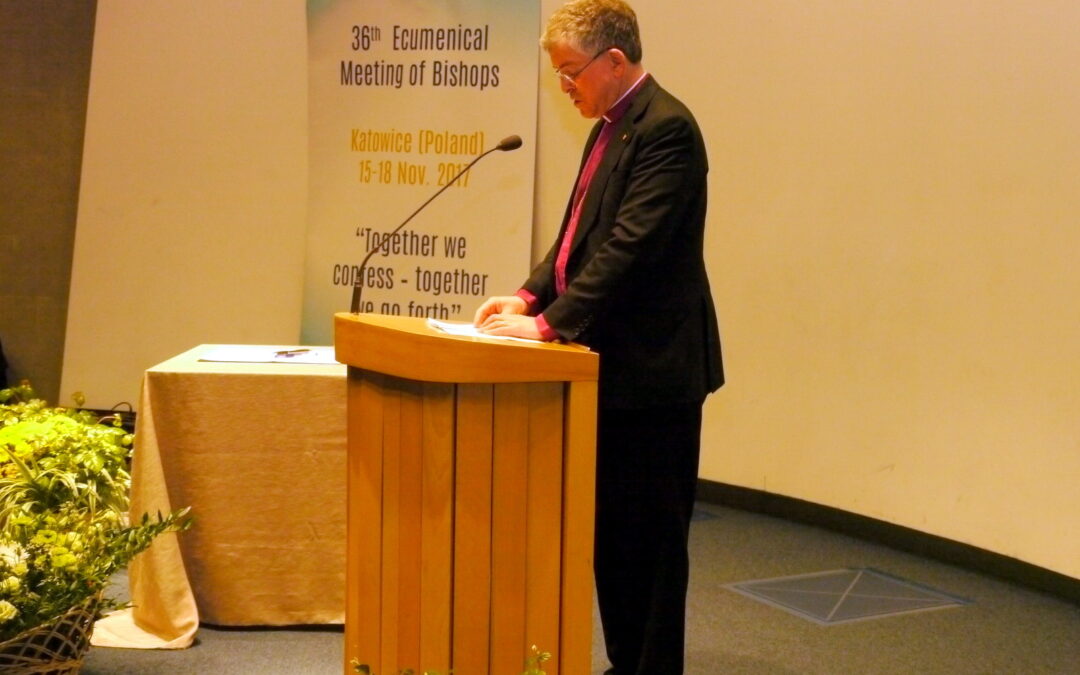
Nov 27, 2017 | Focolare Worldwide
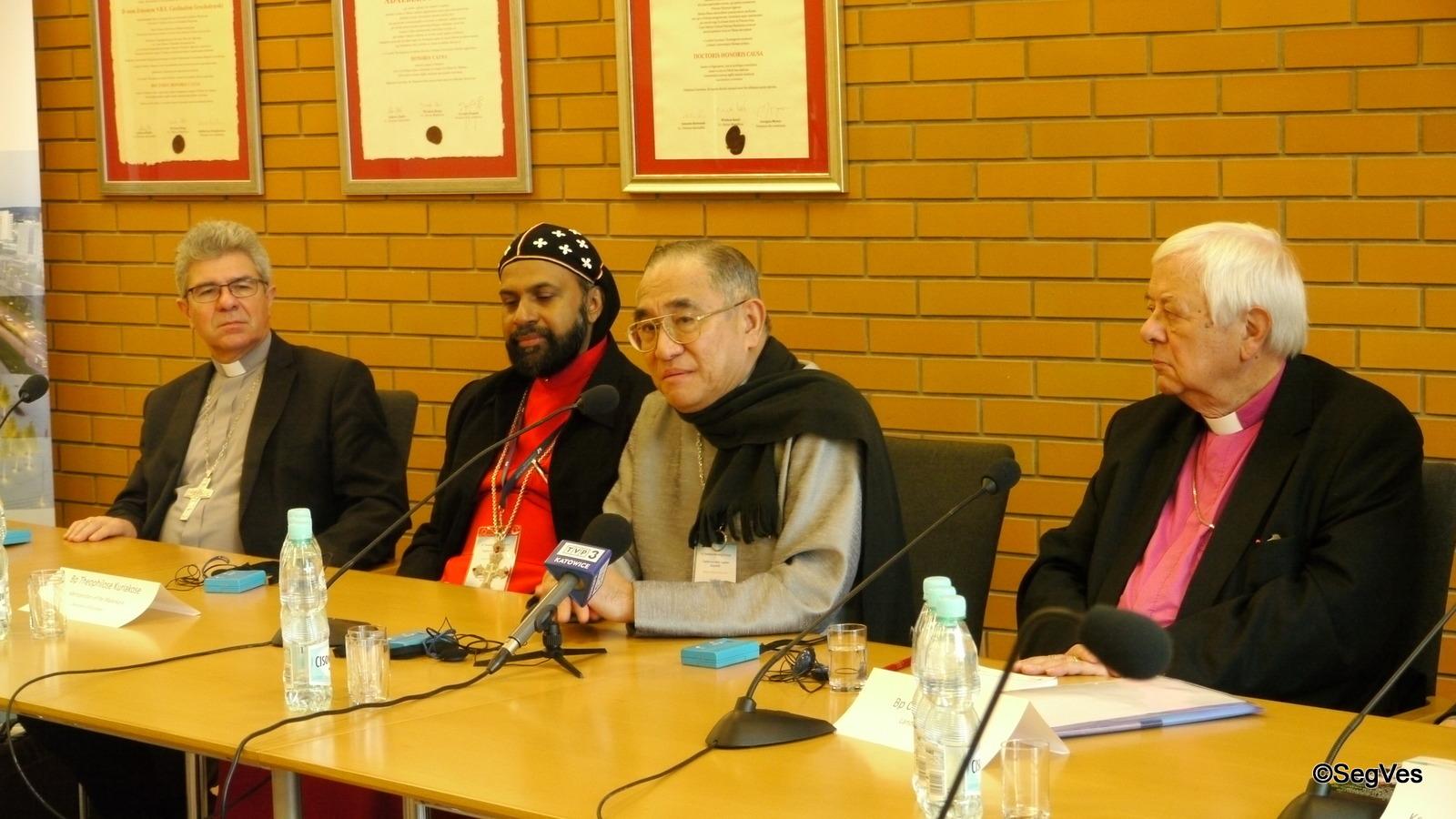 For the first time after 36 years, Poland was the host country of the annual ecumenical convention of the Bishop-friends of the Focolare Movement. After Jerusalem, Istanbul, London, Augsburg and other “symbolic” cities of the ecumenical commitment, Katowice, capital of Slesia, an ancient city of almost 300,000 inhabitant, welcomed, from 15 to 18 November, 35 bishops of different Churches: Orthodox, Syriac-Orthodox, Evangelical-Lutherans, Anglican, Methodists and Catholics from Germany, Austria, England, Ireland, Sweden, Poland, Hungary, Lithuania, Latvia, Czech Republic, but also Brazil, Cyprus, India, Democratic Republic of Congo, Thailand and the USA. Along with around thirty lay people the bishops gathered in Katowice represented a cross section of various social and ecclesial communities, driven by the desire to make an experience of fraternal communion. “Together we confess, together we go forth” was the title of the Convention, which was organized not only by the Focolare Movement, but also by the local Catholic Archdiocese and the Evangelical-Lutheran Church of Augustinian Confession, the Orthodox Church of Sosnowiec, the Faculty of Theology of the Slesia University and the city of Katowice itself, represented by mayor Marcin Krupa.
For the first time after 36 years, Poland was the host country of the annual ecumenical convention of the Bishop-friends of the Focolare Movement. After Jerusalem, Istanbul, London, Augsburg and other “symbolic” cities of the ecumenical commitment, Katowice, capital of Slesia, an ancient city of almost 300,000 inhabitant, welcomed, from 15 to 18 November, 35 bishops of different Churches: Orthodox, Syriac-Orthodox, Evangelical-Lutherans, Anglican, Methodists and Catholics from Germany, Austria, England, Ireland, Sweden, Poland, Hungary, Lithuania, Latvia, Czech Republic, but also Brazil, Cyprus, India, Democratic Republic of Congo, Thailand and the USA. Along with around thirty lay people the bishops gathered in Katowice represented a cross section of various social and ecclesial communities, driven by the desire to make an experience of fraternal communion. “Together we confess, together we go forth” was the title of the Convention, which was organized not only by the Focolare Movement, but also by the local Catholic Archdiocese and the Evangelical-Lutheran Church of Augustinian Confession, the Orthodox Church of Sosnowiec, the Faculty of Theology of the Slesia University and the city of Katowice itself, represented by mayor Marcin Krupa. 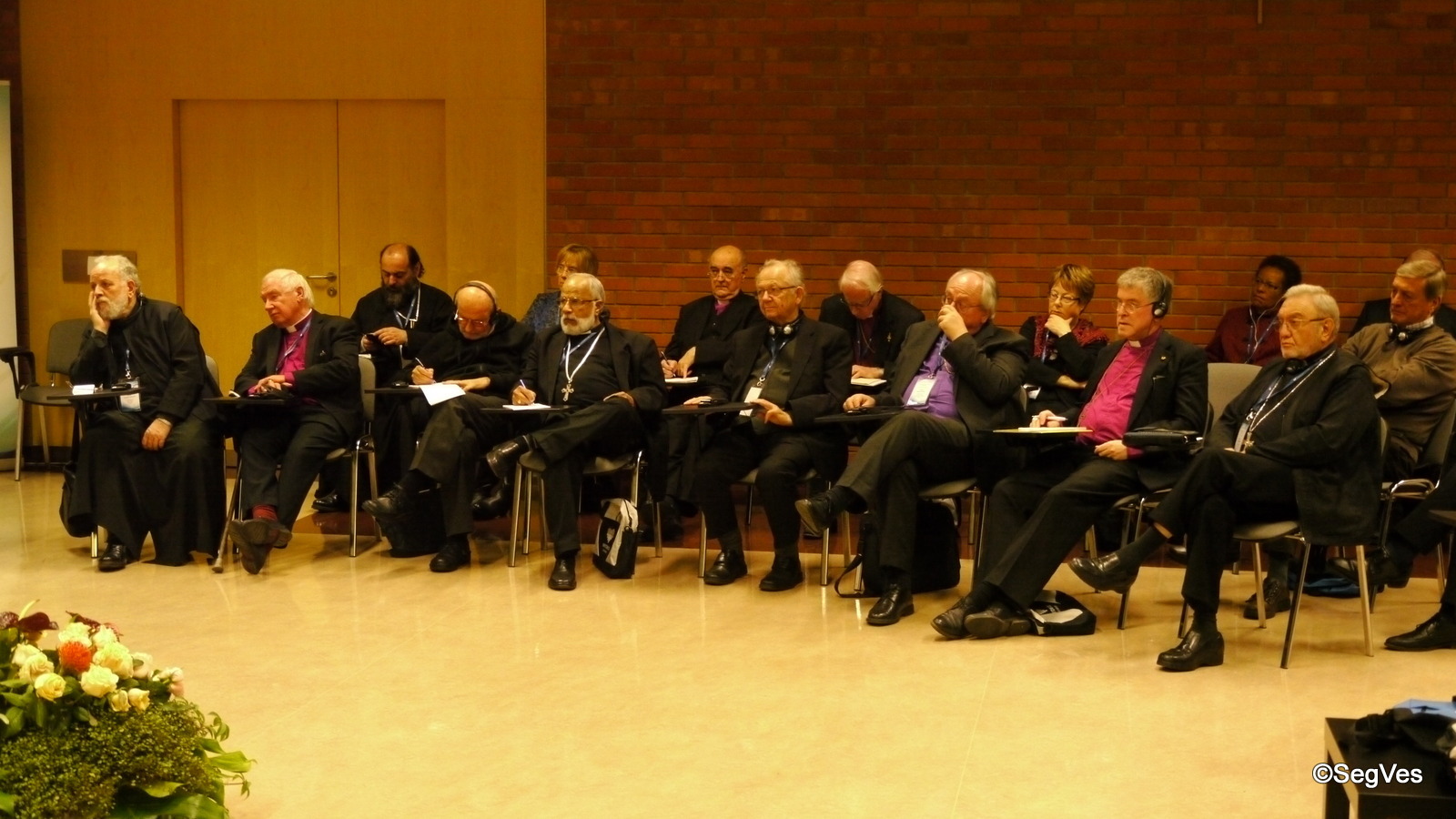 The convention opened with the reflection of Lesley Ellison, an Anglican, on “The Spirituality of unity: an ecumenical spirituality,” and had as its central theme “Mary, the Mother of Jesus,” with the theological studies in the various Catholic, Evangelic, Anglican and Orthodox perspectives. There were many encounters, celebrations and moments of prayer according to the various traditions, sealed by a “pact of mutual love” to live fraternal communion and to “love the Church of the other as one’s own Brendan Leahly is the Catholic bishop of Limerick (Irelanda), expert and counselor of ecumenical dialogue in his country. Interviewed on the phone, he said: “I want to underline the warm welcome received in Katowice, which I had already visited in 1991, on the occasion of Chiara Lubich’s encounter with the Focolare centers of Western and Eastern Europe. It is a highly developed city, which valorizes diversity and hospitality. Just as what we experienced in these days, the hospitality of the Faculty of Theology which hosted us, but also of the Catholic, Lutheran and Orthodox Churches.” The convention was the occasion to get to know one another better, and acquire a deeper knowledge of the different ecclesial and socio-cultural realities we live in, especially in the Middle East and Eastern Europe. We realize that we cannot offer solutions for the problems of those countries (especially regarding the Middle East), but we can at least carry one another’s burdens. Feeling the suffering of others has enlarged my heart. Now I no longer feel only like an Irish bishop, I carry within also the situations and problems of the other bishops. But with a new hope. In every country there are signs of hope, and the steps taken at ecumenical level go to prove this fact. For example in the Czech Republic a process of mutual forgiveness is underway for the errors committed. Ecumenism – he continued– is a reality that started its path many years ago, and will meet ever new situations and give new testimonials. It is, after all, an experience of giving and receiving. What strikes me is the strong Catholic faith which is deeply rooted here in Poland, but also the openness to dialogue with the representatives of the other communities.”
The convention opened with the reflection of Lesley Ellison, an Anglican, on “The Spirituality of unity: an ecumenical spirituality,” and had as its central theme “Mary, the Mother of Jesus,” with the theological studies in the various Catholic, Evangelic, Anglican and Orthodox perspectives. There were many encounters, celebrations and moments of prayer according to the various traditions, sealed by a “pact of mutual love” to live fraternal communion and to “love the Church of the other as one’s own Brendan Leahly is the Catholic bishop of Limerick (Irelanda), expert and counselor of ecumenical dialogue in his country. Interviewed on the phone, he said: “I want to underline the warm welcome received in Katowice, which I had already visited in 1991, on the occasion of Chiara Lubich’s encounter with the Focolare centers of Western and Eastern Europe. It is a highly developed city, which valorizes diversity and hospitality. Just as what we experienced in these days, the hospitality of the Faculty of Theology which hosted us, but also of the Catholic, Lutheran and Orthodox Churches.” The convention was the occasion to get to know one another better, and acquire a deeper knowledge of the different ecclesial and socio-cultural realities we live in, especially in the Middle East and Eastern Europe. We realize that we cannot offer solutions for the problems of those countries (especially regarding the Middle East), but we can at least carry one another’s burdens. Feeling the suffering of others has enlarged my heart. Now I no longer feel only like an Irish bishop, I carry within also the situations and problems of the other bishops. But with a new hope. In every country there are signs of hope, and the steps taken at ecumenical level go to prove this fact. For example in the Czech Republic a process of mutual forgiveness is underway for the errors committed. Ecumenism – he continued– is a reality that started its path many years ago, and will meet ever new situations and give new testimonials. It is, after all, an experience of giving and receiving. What strikes me is the strong Catholic faith which is deeply rooted here in Poland, but also the openness to dialogue with the representatives of the other communities.” 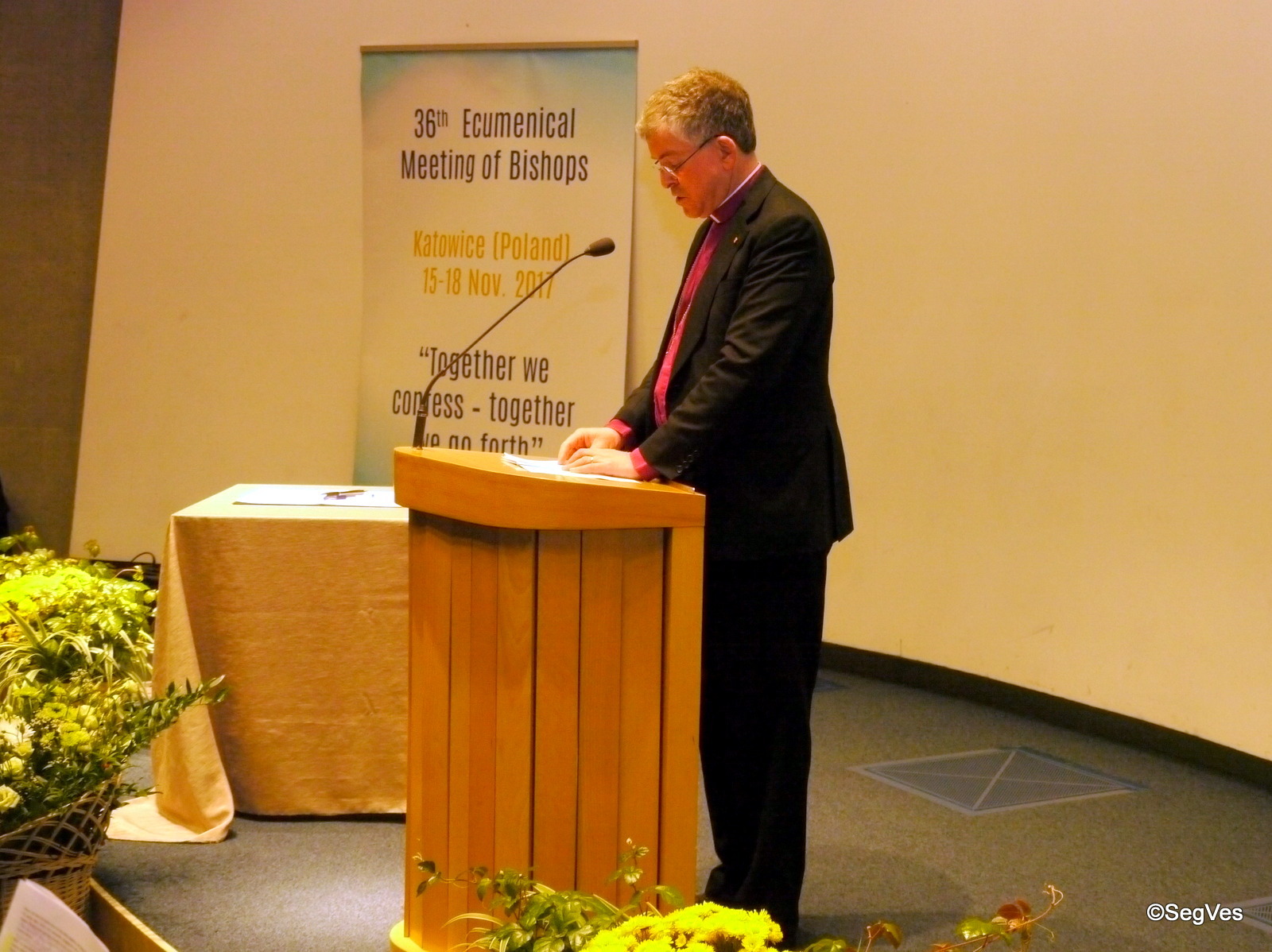 Åke Bonnier, Lutheran bishop of the diocese of Skara, in Sweden, said he was happy about the convention: «We were not bishops but brothers. What we shared in the convention was a reality, both during the breaks and intervals, and also during the celebrations. This was very important for me, it gave me new strength and enthusiasm. I now look forward to next year, when, I hope all of them and also others can come to Sweden. If they ask me if this meeting was important as a path for the unity of Christians, my answer is yes. Unity is not something that will come about only in the future, it is already a reality among us.”
Åke Bonnier, Lutheran bishop of the diocese of Skara, in Sweden, said he was happy about the convention: «We were not bishops but brothers. What we shared in the convention was a reality, both during the breaks and intervals, and also during the celebrations. This was very important for me, it gave me new strength and enthusiasm. I now look forward to next year, when, I hope all of them and also others can come to Sweden. If they ask me if this meeting was important as a path for the unity of Christians, my answer is yes. Unity is not something that will come about only in the future, it is already a reality among us.”

Nov 25, 2017 | Non categorizzato
 If one day all people, not as individuals, but as peoples, learned to put themselves aside, to put aside the ideas they have about their own countries, their kingdoms, and offer them as incense to the Lord, the king of a kingdom that is not of this world, the guide of history, and if all were to do this as the expression of the mutual love between states that God asks for, just as he asks for mutual love among individuals, that day would be the beginning of a new era. For on that day, just as Jesus is present among two who love each other in Christ, Jesus will be alive and present among peoples, given finally his true place as the one king, not only of individual hearts but also of nations: he will be Christ the King. Christian peoples, or their representatives, must learn how to sacrifice their “collective” egos. This is the price. Nothing less is asked of each of us in order for our souls to be consumed in unity. Now is the time for every people to go beyond their own borders, to look further. Now is the time to love other countries as our own, to acquire a new purity of vision. To be Christians it is not enough to be detached from ourselves. The times we live in demand something more from the followers of Christ: the awareness of Christianity’s social dimension, which not only builds up one’s own land according to the law of Christ, but also enables other lands to be built up as well, through the universal action of the Church, and through the supernatural vision given to us by God the Father, who sees things quite differently from the way we do. We need to live as the Mystical Body of Christ in such an excellent way as to translate it into the mystical body of society […] May the Lord have mercy on this divided and confused world, on these peoples closed within their shells, contemplating their own beauty — the only beauty that exists for them – that is both limiting and unsatisfying) They strain to hold onto their treasures against all odds, the very treasures that could help other peoples who are dying of hunger. May the Lord cause all barriers to fall, and allow love to flow uninterruptedly among all lands, bringing with it torrents of spiritual and material goods. Let’s hope that the Lord will bring about a new order in the world. He alone can make humanity one family and cultivate the unique characteristics of each people so that the splendour of each, put at the service of others, may shine out with the one light of life. This light will make each earthly homeland more beautiful, so it becomes a prelude to the eternal Homeland. See also: Chiara Lubich , “Mary Transparency of God”, New City Press, 2003 p 102
If one day all people, not as individuals, but as peoples, learned to put themselves aside, to put aside the ideas they have about their own countries, their kingdoms, and offer them as incense to the Lord, the king of a kingdom that is not of this world, the guide of history, and if all were to do this as the expression of the mutual love between states that God asks for, just as he asks for mutual love among individuals, that day would be the beginning of a new era. For on that day, just as Jesus is present among two who love each other in Christ, Jesus will be alive and present among peoples, given finally his true place as the one king, not only of individual hearts but also of nations: he will be Christ the King. Christian peoples, or their representatives, must learn how to sacrifice their “collective” egos. This is the price. Nothing less is asked of each of us in order for our souls to be consumed in unity. Now is the time for every people to go beyond their own borders, to look further. Now is the time to love other countries as our own, to acquire a new purity of vision. To be Christians it is not enough to be detached from ourselves. The times we live in demand something more from the followers of Christ: the awareness of Christianity’s social dimension, which not only builds up one’s own land according to the law of Christ, but also enables other lands to be built up as well, through the universal action of the Church, and through the supernatural vision given to us by God the Father, who sees things quite differently from the way we do. We need to live as the Mystical Body of Christ in such an excellent way as to translate it into the mystical body of society […] May the Lord have mercy on this divided and confused world, on these peoples closed within their shells, contemplating their own beauty — the only beauty that exists for them – that is both limiting and unsatisfying) They strain to hold onto their treasures against all odds, the very treasures that could help other peoples who are dying of hunger. May the Lord cause all barriers to fall, and allow love to flow uninterruptedly among all lands, bringing with it torrents of spiritual and material goods. Let’s hope that the Lord will bring about a new order in the world. He alone can make humanity one family and cultivate the unique characteristics of each people so that the splendour of each, put at the service of others, may shine out with the one light of life. This light will make each earthly homeland more beautiful, so it becomes a prelude to the eternal Homeland. See also: Chiara Lubich , “Mary Transparency of God”, New City Press, 2003 p 102
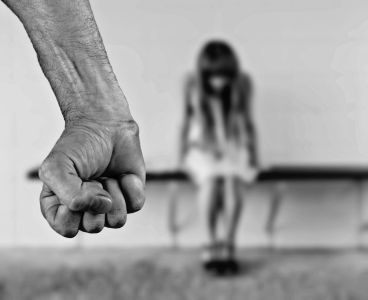
Nov 25, 2017 | Non categorizzato
 The “International Day for the Elimination of Violence Against Women” was established by the UN in 1999. It occurs every year on November 25 and governments, international organizations and NGOs are committed to raising awareness about the issue and thus creating public opinion. 18 years have passed since its establishment. Much has been done but it’s far from enough. There’s no need to look further afield where violence against women is concerned. It can happen right next door to us and go undetected.. . The words of St John Paul II resound very strongly in his Apostolic Letter Mulieris dignitatem (MD, August 15, 1988), underlining that “God created man and woman in his image, not just as individuals but, in their commonality as the as ‘unity of the two’. The man and woman, therefore, are essentially the same, both persons called as such to participate in the intimate life of God and to live in mutual communion with one another, in love, on the model of God who is Love, who is unity in the Trinity, and to mirror in the world the communion of love that exists in God (MD 7). ” It is a milestone which needs to be faced daily as individuals and as a society.
The “International Day for the Elimination of Violence Against Women” was established by the UN in 1999. It occurs every year on November 25 and governments, international organizations and NGOs are committed to raising awareness about the issue and thus creating public opinion. 18 years have passed since its establishment. Much has been done but it’s far from enough. There’s no need to look further afield where violence against women is concerned. It can happen right next door to us and go undetected.. . The words of St John Paul II resound very strongly in his Apostolic Letter Mulieris dignitatem (MD, August 15, 1988), underlining that “God created man and woman in his image, not just as individuals but, in their commonality as the as ‘unity of the two’. The man and woman, therefore, are essentially the same, both persons called as such to participate in the intimate life of God and to live in mutual communion with one another, in love, on the model of God who is Love, who is unity in the Trinity, and to mirror in the world the communion of love that exists in God (MD 7). ” It is a milestone which needs to be faced daily as individuals and as a society.

Nov 24, 2017 | Non categorizzato
 “Have I really been transferred here?” Francesca asked with a pounding heart as the jail doors –a series of about ten big iron gates – opened out for her. Someone had described it as “a descent into hell.” After attending a course for jail teachers, Francesca entered the classroom for the first time. “I thought I would be assisted by a jail policeman, instead the only agent on shift had to monitor around ten classrooms and also perform other tasks at the same time. On the second day I said to myself: “It can’t go on like this! If I am afraid, it is useless that God has sent me here!” From that moment on I felt I was free to love.” In trying to see in the jailees only persons inhabited by Jesus, a journey began for Francesca. It was not so much the going to and returning from a place without limits to a place of reclusion, it was the going to the heart of many stories imbued with real humanity, errors, fear, and anguish, and also to the decision to take one’s life again into one’s hands. It was the start of a deep dialogue, with each side respecting the role of the other. “I tried to prepare the lessons very well, to make them attractive. I knew that Jesus came with me even in jail. During science lessons I started to explain about anatomy and the relations between organs and systems. Subsequently some jailees started to cut down on cigarettes, gradually abolished the use of tranquillizers, and sunbathed during out-of-cell time.” “Besides the difficulty of teaching students with different educational backgrounds – Francesca says – there other types of problems, the clanging of the gates, the irregular attendance of the students, and continuous transfers to and from other jailhouses. That is why whoever stood before me in that moment became even more precious. I might not have seen him again.” Ermal, is Albanese and a remarkably intelligent boy to whom Francesca had given the article of Pope Francis’s interview with prisoners. From that day on, a deep dialogue started about God and prayer. In a short time, Ermal reached brilliant results in school. “Professor, excuse me, I can’t write anything, I’ve got too many problems!” A young Tunisian held his head in his hands in front of a blank sheet for a class exercise. “I received the permit to bring him earphones for the PC and watch a film in his language. Slowly he relaxed, started to practice sports, made an appeal and is now hoping for a reduction of his term. Now when I see him, he greets me with a smile from behind bars.” «At Christmas –Francesca continues her story – we were invited to participate in the Christmas Eve mass. I was the only one since the other teachers had gone to the one celebrated for the “protected” jailees. We had not decided together. There were also Muslims among those present, others without any religious creed, and some jailees who had committed serious crimes. The Bishop started by saying: “You are not the crime you have committed, you are human beings. The crime regards the past; now let us look ahead with hope.” «In January Ermal obtained house arrest. But in that period he was approached by the gang which was the cause of all his problems. We could not keep contact with him, and couldn’t even get his address. Every day I entrusted him to Mary, asking her to let him return to school. After two months, due to evasion from house arrest, Ermal returned to jail! For us it was “good news” and the occasion for him to continue his studies. In a short time he brilliantly passed the High School exam. The President of the Commission told him: “Do you realise that you’ve got brains? What are you planning for the future?” “I want to study,” he said – “to prepare for University.” «After a year in school, I must say that I have come to know another world, almost like a parallel universe. My heart has expanded, and my way of thinking has changed. Many things that seem necessary “outside” are no longer so when you live a life of privation, where they are seen in the right perspective.” But the change God operates in people’s hearts goes beyond the bars or limits.
“Have I really been transferred here?” Francesca asked with a pounding heart as the jail doors –a series of about ten big iron gates – opened out for her. Someone had described it as “a descent into hell.” After attending a course for jail teachers, Francesca entered the classroom for the first time. “I thought I would be assisted by a jail policeman, instead the only agent on shift had to monitor around ten classrooms and also perform other tasks at the same time. On the second day I said to myself: “It can’t go on like this! If I am afraid, it is useless that God has sent me here!” From that moment on I felt I was free to love.” In trying to see in the jailees only persons inhabited by Jesus, a journey began for Francesca. It was not so much the going to and returning from a place without limits to a place of reclusion, it was the going to the heart of many stories imbued with real humanity, errors, fear, and anguish, and also to the decision to take one’s life again into one’s hands. It was the start of a deep dialogue, with each side respecting the role of the other. “I tried to prepare the lessons very well, to make them attractive. I knew that Jesus came with me even in jail. During science lessons I started to explain about anatomy and the relations between organs and systems. Subsequently some jailees started to cut down on cigarettes, gradually abolished the use of tranquillizers, and sunbathed during out-of-cell time.” “Besides the difficulty of teaching students with different educational backgrounds – Francesca says – there other types of problems, the clanging of the gates, the irregular attendance of the students, and continuous transfers to and from other jailhouses. That is why whoever stood before me in that moment became even more precious. I might not have seen him again.” Ermal, is Albanese and a remarkably intelligent boy to whom Francesca had given the article of Pope Francis’s interview with prisoners. From that day on, a deep dialogue started about God and prayer. In a short time, Ermal reached brilliant results in school. “Professor, excuse me, I can’t write anything, I’ve got too many problems!” A young Tunisian held his head in his hands in front of a blank sheet for a class exercise. “I received the permit to bring him earphones for the PC and watch a film in his language. Slowly he relaxed, started to practice sports, made an appeal and is now hoping for a reduction of his term. Now when I see him, he greets me with a smile from behind bars.” «At Christmas –Francesca continues her story – we were invited to participate in the Christmas Eve mass. I was the only one since the other teachers had gone to the one celebrated for the “protected” jailees. We had not decided together. There were also Muslims among those present, others without any religious creed, and some jailees who had committed serious crimes. The Bishop started by saying: “You are not the crime you have committed, you are human beings. The crime regards the past; now let us look ahead with hope.” «In January Ermal obtained house arrest. But in that period he was approached by the gang which was the cause of all his problems. We could not keep contact with him, and couldn’t even get his address. Every day I entrusted him to Mary, asking her to let him return to school. After two months, due to evasion from house arrest, Ermal returned to jail! For us it was “good news” and the occasion for him to continue his studies. In a short time he brilliantly passed the High School exam. The President of the Commission told him: “Do you realise that you’ve got brains? What are you planning for the future?” “I want to study,” he said – “to prepare for University.” «After a year in school, I must say that I have come to know another world, almost like a parallel universe. My heart has expanded, and my way of thinking has changed. Many things that seem necessary “outside” are no longer so when you live a life of privation, where they are seen in the right perspective.” But the change God operates in people’s hearts goes beyond the bars or limits.
Nov 23, 2017 | Non categorizzato
The Sophia University Institute is pleased to invite you to the Inauguration of the Athenagoras- Chiara Lubich Ecumenical Professorship that will be chaired by His Eminence Gennadios Zervos, Orthodox Archbishop of Italy and Malta entitled: The Partriach Athenagoras and Chiara Lubich, protagonist of unity. Maria Stella Giannetti: Communication – External Relations Istituto Universitario Sophia Via san Vito 28, Loppiano – 50064 Figline e Incisa Valdarno (FI) Tel. +39.055.9051521 – Cell. +39.349 62 72 045
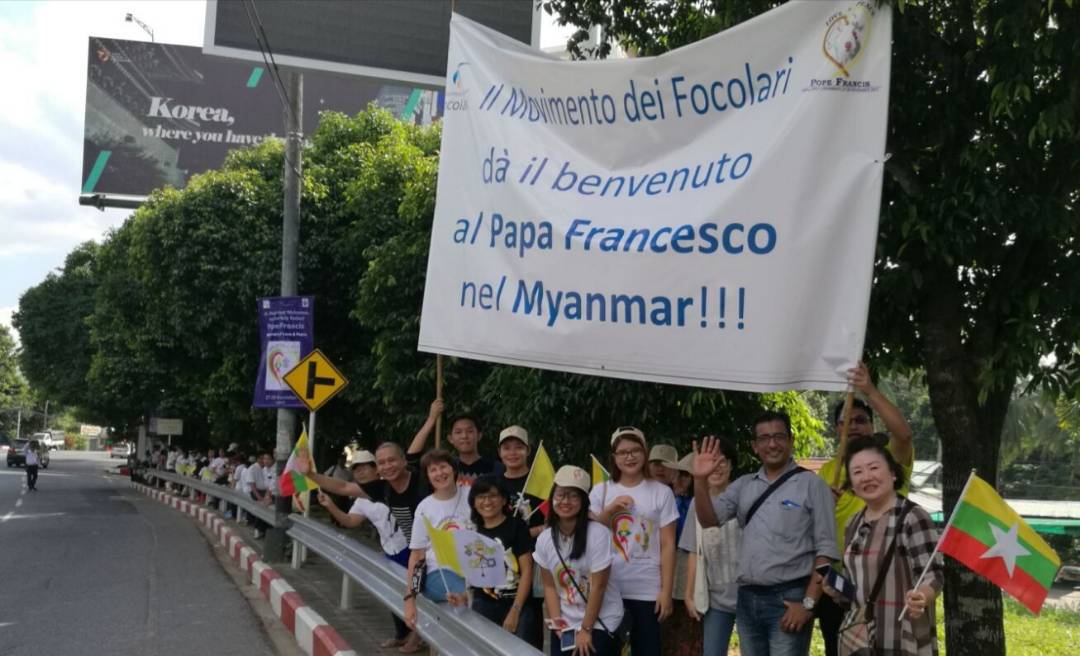
Nov 23, 2017 | Non categorizzato
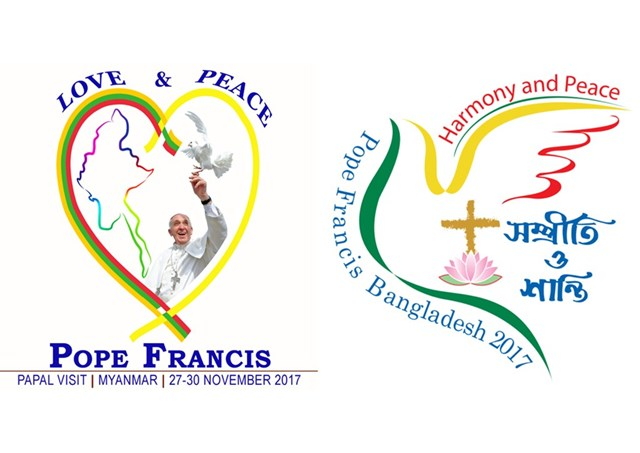 From 26 November to 2 December, Pope Francis will embark on an apostolic voyage to Asia, stopping in Myanmar from 27 to 30 November and in Bangladesh from November 30 till December 2. It will be the first visit of a Pontiff to Myanmar, while in 1986, John Paul II visited Bangladesh, one of the most densely populated and poorest countries of the world.
From 26 November to 2 December, Pope Francis will embark on an apostolic voyage to Asia, stopping in Myanmar from 27 to 30 November and in Bangladesh from November 30 till December 2. It will be the first visit of a Pontiff to Myanmar, while in 1986, John Paul II visited Bangladesh, one of the most densely populated and poorest countries of the world.  Pope Francis will travel to Dhaka, the capital city of Bangladesh. During his stay, he will meet with prominent political and civil authorities, as well as young Muslim and Hindu religious leaders in order to address major issues such as climate change, migration, the refugee crisis, the future of young people, all in view of renewed hope. The members of the Focolare Movement will be accompanying this intense week long schedule in Asia with prayer for harmony and peace. A video message recorded by Pope Francis in view of the apostolic visit to Myanmar
Pope Francis will travel to Dhaka, the capital city of Bangladesh. During his stay, he will meet with prominent political and civil authorities, as well as young Muslim and Hindu religious leaders in order to address major issues such as climate change, migration, the refugee crisis, the future of young people, all in view of renewed hope. The members of the Focolare Movement will be accompanying this intense week long schedule in Asia with prayer for harmony and peace. A video message recorded by Pope Francis in view of the apostolic visit to Myanmar
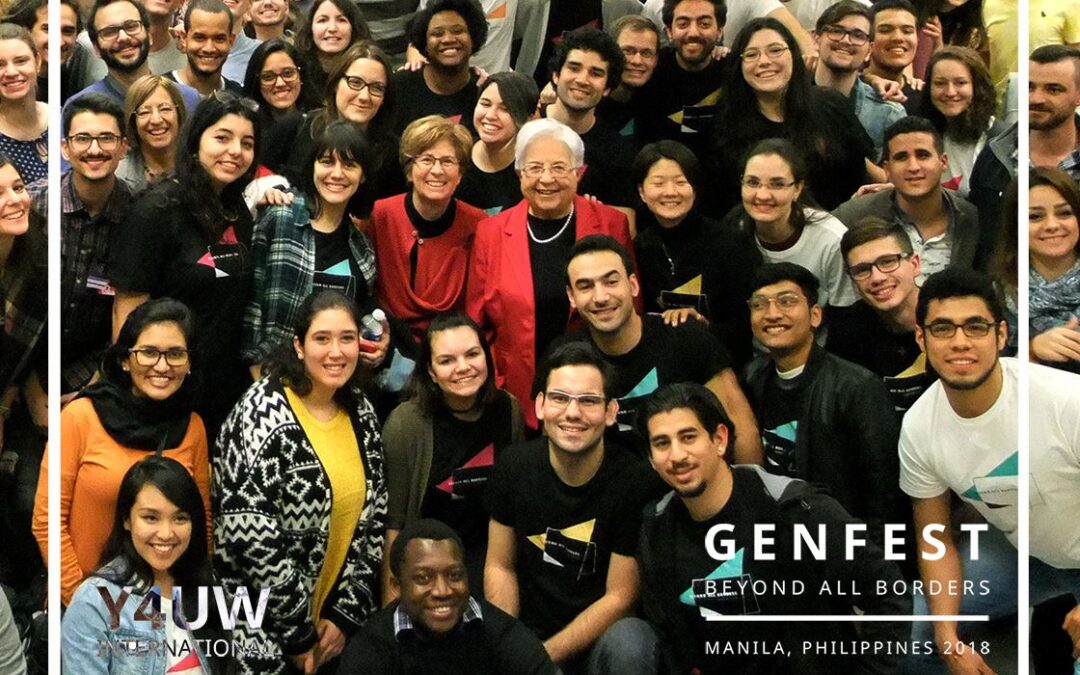
Nov 23, 2017 | Focolare Worldwide
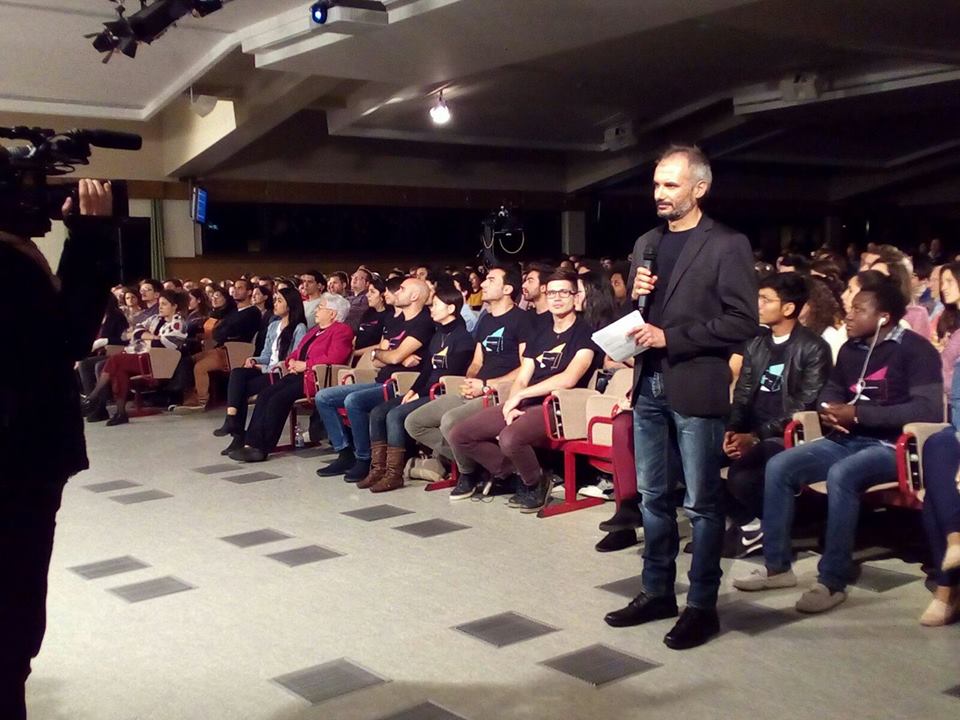
Paolo Balduzzi, TV journalist, presents the “Youth for a united World” during the live worldwide transmission.
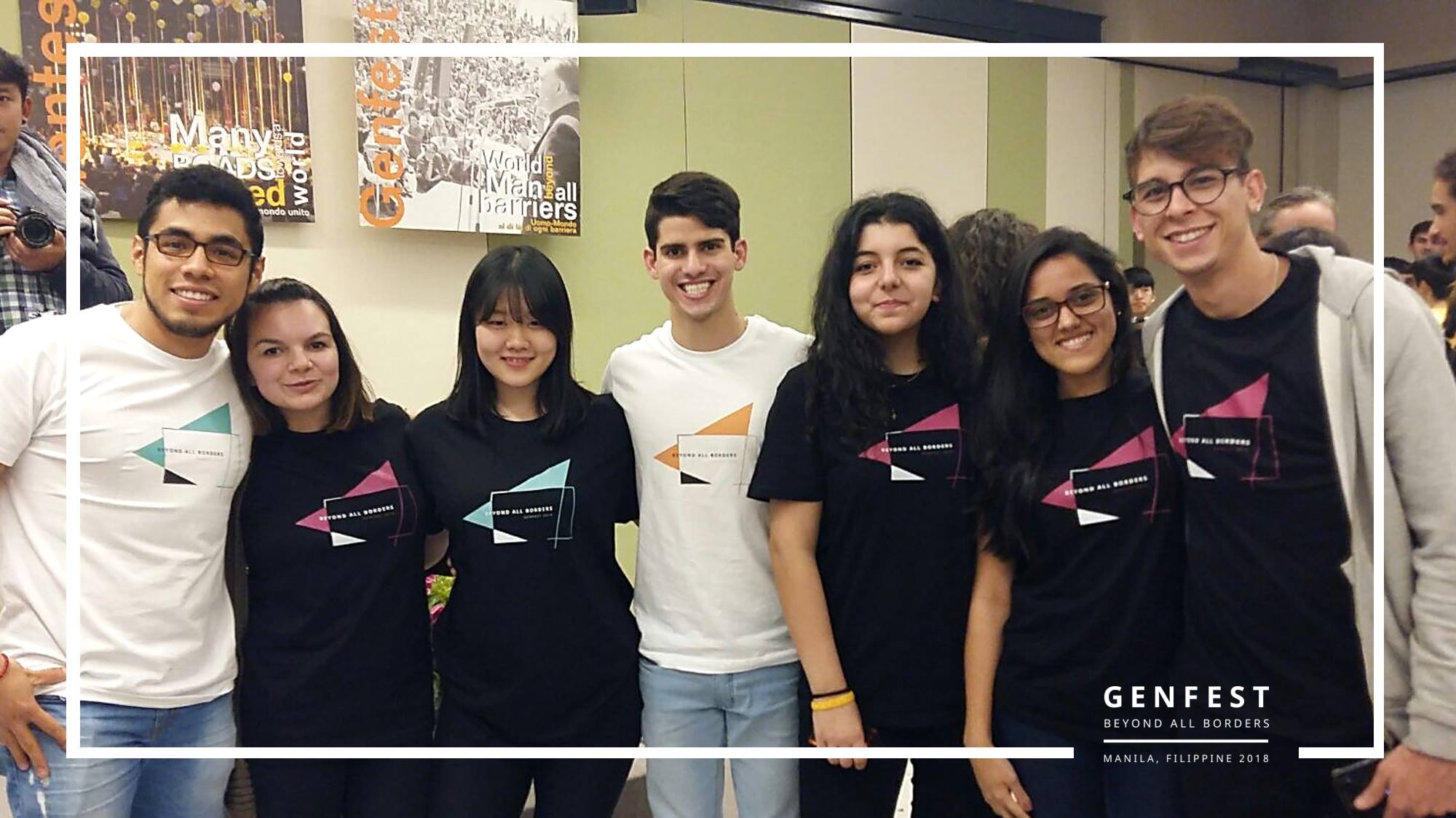 It’s that great idea that was launched by Chiara Lubich in 1987, the idea she bequeathed to the new generations. That year, the Focolare foundress stood in front of a vast crowd of young people and explained to them the reason for the Genfest: “An explosion of fires, not artificial fireworks, but real fires, the fire of God’s love. The goal of ut omnes (“Father, may they all be one” [Jn 17:20-23]) draws near. Jesus wins over and draws people along, leaving behind everything that doesn’t move, like a stream of fresh water that leaves to the sides all the things that can’t be carried ahead in its limpid waters.” Chiara added: “You’ll see the miracles of God’s grace, because God is with us, God is in our midst. He’s the only Powerful One.” Standing among the young people was the current president of the Focolare, Maria Voce. “I’d like to say a huge thank you to the young people.” They’ve made a great act of courage “which seems like the answer of today to the appeal Chiara has launched ever since 1960: ‘Young people of the world unite!’ This appeal still resounds right now, not only for you, but for everyone. The goal of a united world has not yet been reached. The first generation couldn’t do it alone. The second won’t do it alone either, because its purpose is so vast. The idea of a united world has to be passed on from one generation to the next, and all of them united together can hope to bring it to fulfilment.”
It’s that great idea that was launched by Chiara Lubich in 1987, the idea she bequeathed to the new generations. That year, the Focolare foundress stood in front of a vast crowd of young people and explained to them the reason for the Genfest: “An explosion of fires, not artificial fireworks, but real fires, the fire of God’s love. The goal of ut omnes (“Father, may they all be one” [Jn 17:20-23]) draws near. Jesus wins over and draws people along, leaving behind everything that doesn’t move, like a stream of fresh water that leaves to the sides all the things that can’t be carried ahead in its limpid waters.” Chiara added: “You’ll see the miracles of God’s grace, because God is with us, God is in our midst. He’s the only Powerful One.” Standing among the young people was the current president of the Focolare, Maria Voce. “I’d like to say a huge thank you to the young people.” They’ve made a great act of courage “which seems like the answer of today to the appeal Chiara has launched ever since 1960: ‘Young people of the world unite!’ This appeal still resounds right now, not only for you, but for everyone. The goal of a united world has not yet been reached. The first generation couldn’t do it alone. The second won’t do it alone either, because its purpose is so vast. The idea of a united world has to be passed on from one generation to the next, and all of them united together can hope to bring it to fulfilment.” 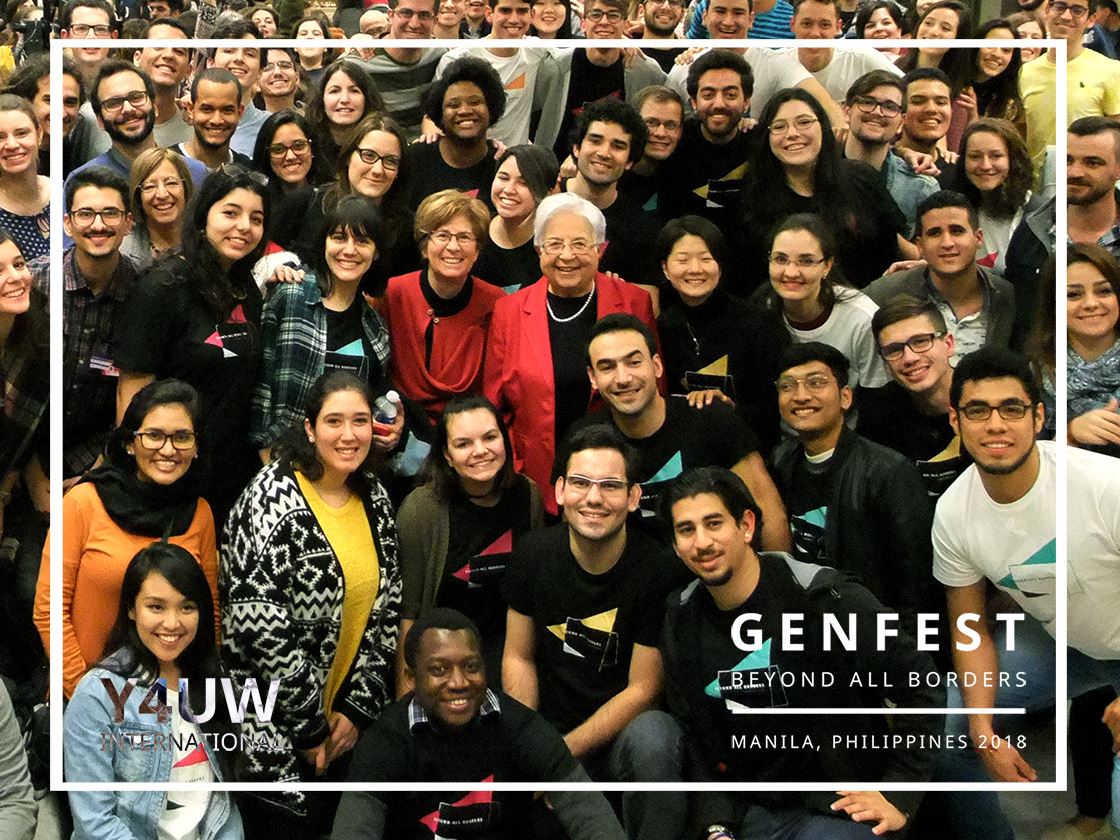 She went on to say: “The Genfest isn’t something that only regards the young, but everyone. That’s why I want to go, and I hope there will be many of us.” Everyone can do something. “Some may say: but I’m sick, I can’t… Offer your pain! Let’s all of us step up. You can help by offering hospitality; you can help the young people to prepare their programmes; you can give financial support for the young people who otherwise wouldn’t be able to attend. Let’s do all we can, whatever it takes. The Genfest is mine, it’s ours!” Before signing off, young person from the Philippines leaves everyone with a triple task: “First: organize a local Genfest. Second: do a concrete project to help at least one young person go to Manila. Third: Buy the T-shirt with our logo.” Find all the details at: Youth for a United World website, and remember this acronym Y4UW. See also: www.focolare.org/en/genfest-2018/
She went on to say: “The Genfest isn’t something that only regards the young, but everyone. That’s why I want to go, and I hope there will be many of us.” Everyone can do something. “Some may say: but I’m sick, I can’t… Offer your pain! Let’s all of us step up. You can help by offering hospitality; you can help the young people to prepare their programmes; you can give financial support for the young people who otherwise wouldn’t be able to attend. Let’s do all we can, whatever it takes. The Genfest is mine, it’s ours!” Before signing off, young person from the Philippines leaves everyone with a triple task: “First: organize a local Genfest. Second: do a concrete project to help at least one young person go to Manila. Third: Buy the T-shirt with our logo.” Find all the details at: Youth for a United World website, and remember this acronym Y4UW. See also: www.focolare.org/en/genfest-2018/















